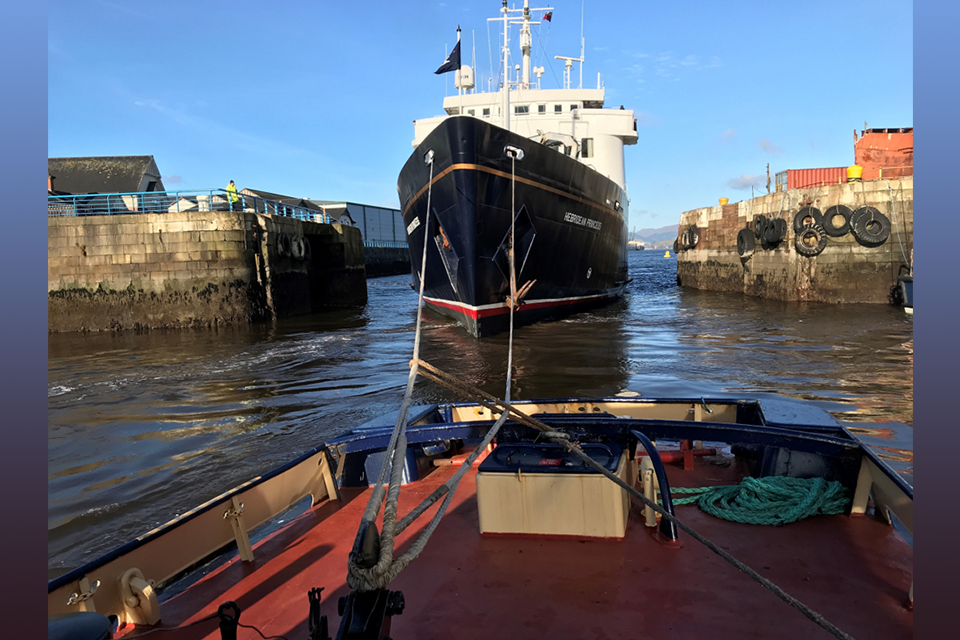Safety Alert: MAIB report on fatal capsize of tug
Image courtesy of Ian Catterson
The UK Marine Accident Investigation Branch (MAIB) has published a report into the fatal girting(*) and capsize of a tug while assisting a passenger vessel.
Summary
February 2023, a twin-screw conventional tug girted and capsized while attached to the stern of a passenger vessel which was making its approach to dock. The two crew members were unable to escape from the capsized vessel and lost their lives.
Safety issues
• the marine pilot’s training had not prepared them to work with conventional tugs
• master/pilot and pilot/tug exchanges were incomplete and, with no shared understanding of the plan, the passenger vessel’s master and the tug masters were unable to challenge the pilot’s intentions
• the passenger vessel’s speed placed significant load on the tug’s lines and almost certainly caused the gob rope to render
• the tug’s gob rope did not prevent it being girted
• the tug’s rapid capsize meant the crew had insufficient time to release its towlines
• an open hatch compromised the tug’s watertight integrity and limited the crew’s chance of survival
Recommendations
Tug owners
review safety management system and risk assessments
provide clear guidance on rigging of the gob rope and safe speed to conduct key manoeuvres
adopt a recognised training scheme for tug masters
Marine Pilotage
commission an independent review of marine pilot training and risk assess and review pilot grade limits and tug matrix
Professional associations representing pilots, harbourmasters, and tug owners
develop appropriate guidance on the safety issues raised
Chief Inspector’s Remarks
We include a quote from the Chief Inspector of Marine Accidents which sets out MAIB’s position very clearly on management of towing risks. We have selectively highlighted some points:
This “… was another cruel lesson of how rapidly things can go dreadfully wrong. In less than 10 seconds the tug capsized, and two experienced seafarers lost their lives, because of a breakdown of the systems that should have kept them safe.
Small conventional tugs remain an essential part of UK port operations. However, the vulnerabilities of these vessels must be understood by those that operate and control them.
Harbour authorities, ship and tug masters, and pilots should collectively own this risk. Pilots and tug crews must be suitably trained and experienced for their roles, and they must share a detailed understanding of the towage plan before they start the job. Speed, which has an exponential effect on towing forces, must be carefully controlled and the lines correctly set. Everyone involved must then monitor the execution of the plan and, if needed, act to keep everyone safe.”
* when high athwartships towing forces cause a tug to be pulled sideways through the water by the towline. If the tug is unable to manoeuvre out of this position it is likely to capsize. Also known as girthing, tripping or girding.
CLICK HERE FOR THE PDF OF THE FULL REPORT
Link to the full report:
https://www.gov.uk/maib-reports/girting-and-capsize-of-tug-biter-with-the-loss-of-two-lives-while-assisting-passenger-vessel-hebridean-princess
Notes and resources
TSB Canada video
West of England Loss Prevention Bulletin “The risk of Tugs Capsizing due to Girting”
https://www.westpandi.com/getattachment/ef5ba94b-c981-4ffb-8b26-f156522c2c68/the-risk-of-tugs-capsizing-due-to-girting.pdf
MAIB reports into previous tug accidents including:
MAIB report published July 1999 – Trijnie
MAIB report 17/2008 – Flying Phantom
MAIB report 4/2010 – Ijsselstroom
MAIB report 12/2012 – Chiefton
MAIB report 16/2017 – Domingue
ICHCA International is committed to helping industry to learn lessons fast, learn them once and make sure that they stay learnt. This information is intended to provide all organisations in the cargo supply chain with the opportunity to consider the events and to review and adapt their own health and safety control measures to proactively prevent future incidents.
We are grateful to the Marine Accident Investigation Branch for providing details and for raising awareness. We acknowledge their commitment to sharing learning to benefit others. If you have similar operations, please share this information with managers, operatives and any potentially affected third parties as appropriate. Please also review any of your relevant operations for similar hazardous conditions, risks, and controls. Learning content like this is highly valuable as it is based on real-world experience. We encourage everyone with publishable information about incidents to send it to us, so that we can raise awareness across the whole industry. Please contact us at secretariat@ichca.com; sharing your insight could save a life or prevent injury.
For previous Safety Alerts follow the link: https://ichca.com/safety-alerts

